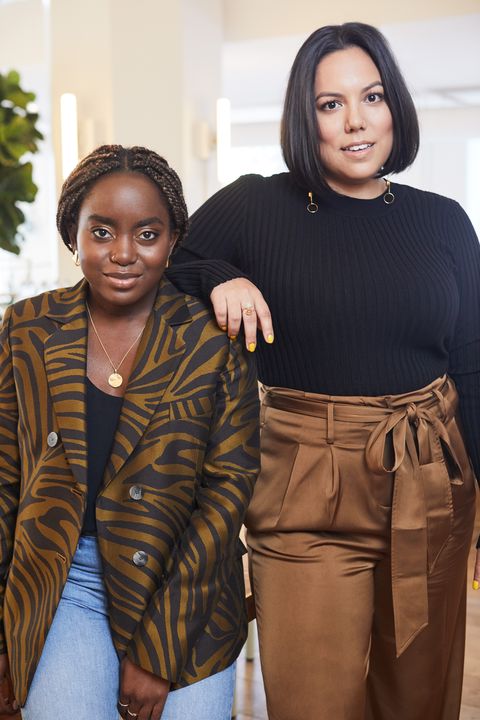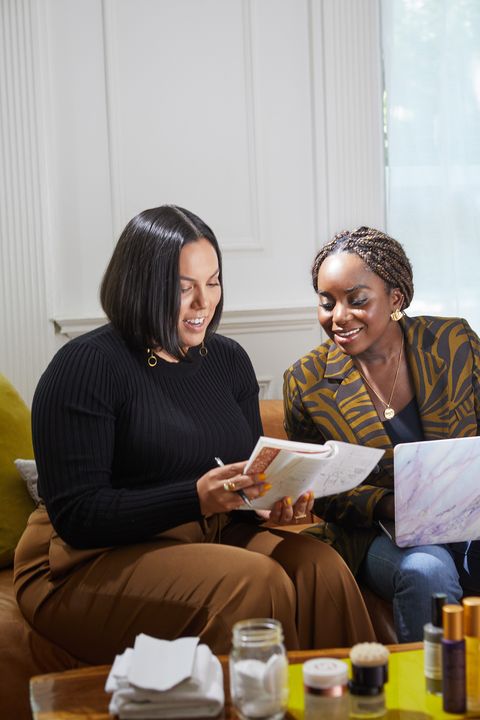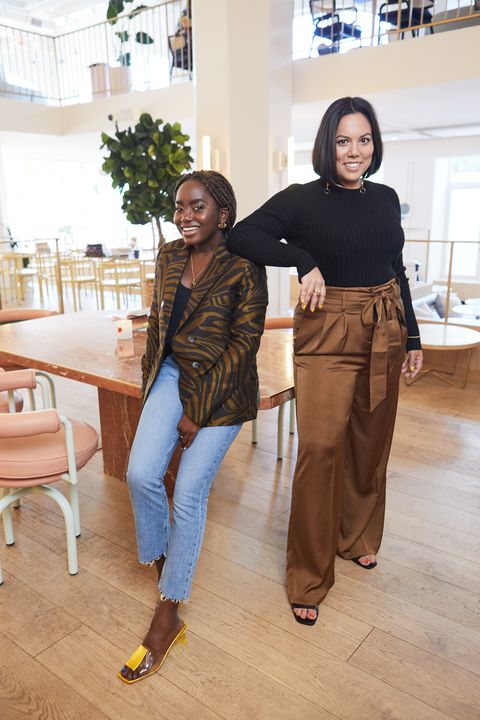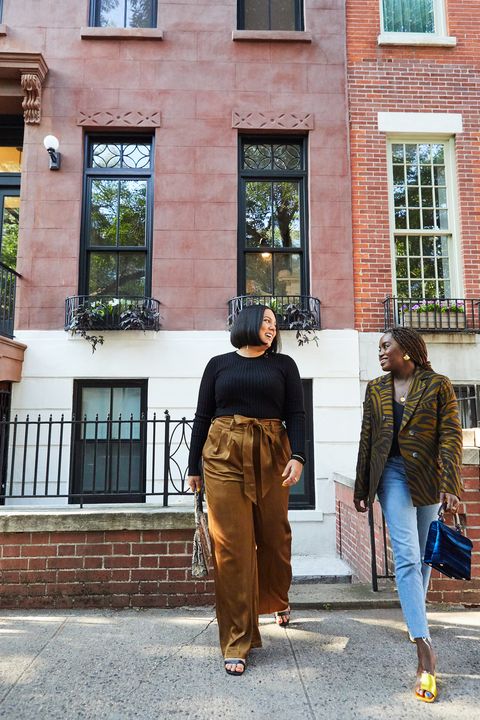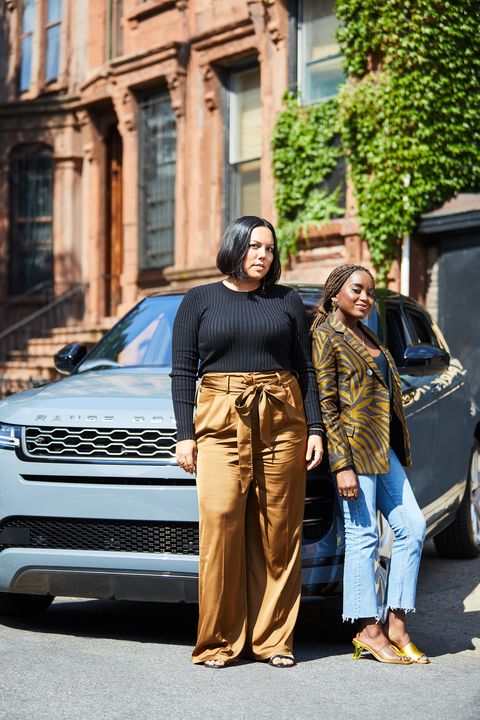In a beauty industry that’s increasingly crowded, loud, and confusing, Mandi Nyambi and Lanya Olmsted want Baalm to be a sanctuary. “I think we can all acknowledge that there has been this big bang in beauty. There are so many products,” Nyambi says. “We don’t have a product problem because there are more than enough options. What we have is the issue of being overwhelmed by the sheer selection of products out there and figuring out, ‘Okay, what’s going to work for me?’”
With Baalm, a membership-based skincare community, the co-founders hope to make sense of the noise. Before signing up, users take a skin quiz, outlining their skincare goals, routines, and favorite products. Then, for a $15 lifetime fee, members get access to individual consultations, product recommendations, events, and more. The startup is built on a subscription model, so it isn’t beholden to advertisers, and it prioritizes personalization, meaning no two members will have exactly the same experience.
That’s also true of Nyambi and Olmsted, who arrived at skincare through very different paths. Throughout high school and college, Olmsted, the company’s creative director, had a routine that consisted of primarily using a now-ubiquitous apricot-scented drugstore exfoliator. In her 20s, though, she became a devoted reader of online beauty publications, poring over new trends and celebrity skincare routines and dropping cash on whatever they recommended.
“I never had any adverse reactions, but I spent a ton of money I did not need to spend on products that I probably could have gotten for $40 versus $100,” she says.
Nyambi, Baalm’s CEO and the author of the skincare guide Fresh Face, would sample products that her mom had around the house from her work as a cosmetics rep. She soon found, though, that what agreed with her mom’s skin often disagreed with hers. “She would try something and it would be fine for her, but then it would make me break out or I’d have an allergic reaction to it. And then there was no recourse for what to do next,” she says.
As it turned out, Nyambi had eczema, but for years those early experiences scared her away from trying new products on her face. What it took, eventually, was digging through scientific papers on the biomedical database PubMed to figure out which ingredients were backed by research. (Her dad was an HIV/AIDS researcher and a professor at NYU, so this wasn’t a totally unusual course of action in her household.)
Olmsted and Nyambi also took their own unique routes toward entrepreneurship. The two met as freshmen at Harvard University; Nyambi was studying stem cell biology and on track to go to medical school, and Olmsted was studying psychology and planning to go into marketing.
After earning a second degree (a masters in nutrition), Nyambi was working in health tech consulting when she got the opportunity to pitch a business idea to a multinational corporation’s skincare-research arm. After sinking so much effort into dealing with her eczema and sensitive skin, she wanted to do the same for others, whatever their skin concerns might be.
But she needed someone to help her make the pitch look good. She reached out to Olmsted, who was working in UX design, to see if she might be able to connect her with a design student who could give her a hand.
Olmsted refused. “I said, ‘I’m not going to connect you to anyone. You’re going to work with me,’” she says, laughing. “I was so obsessed with skincare and trying products and so into the idea, and also the chance to work with Mandi.”
They quickly discovered that they were natural collaborators: Nyambi is a big-picture thinker who’s always considering how their decisions now will affect the business down the line, while Olmsted analyzes problems from the user’s point of view, homing in on the details.
Their friendship outside of business has also been an asset, rather than an obstacle, Olmsted says: “Because we were friends before, we bring that into our work relationship, and I think that makes us stronger. If Mandi’s having a bad day because of something going on in her life, that affects how we’re working together; that trust and that friendship allows us to approach decisions in a caring way.”
Their business began as a newsletter and evolved as they built a community of readers and came to better understand their skincare needs, routines, and histories. At first, the founders shied away from offering product recommendations; they didn’t want to seem biased, and they reasoned that even if a serum worked wonders for one person’s skin, it could be totally ineffective for another’s. Soon, though, they realized that readers wanted examples of what to look for, and many—even skincare enthusiasts—weren’t sure how to invest in the right products and get the most bang for their buck.
“The other side that we pieced out was that we were feeling really lonely in our skincare journeys,” Nyambi says. “We didn’t know who to turn to. A lot of people don’t go to a dermatologist when they’re just trying to find a cleanser or an exfoliating agent, and they also don’t have friends or family who have the knowledge to figure this out either.” Building a platform where members could talk to and share resources with one another seemed like a logical next step.
This summer, the company rebranded from Le CultureClub to Baalm, a name meant to reflect their new direction—one focused more on simplifying skincare than on the latest products or trends—as well as evoke a sense of peace and calm, like the feeling you get coming home after a long day.
Sitting in the sunken velvet conversation pit at their home base of The Wing DUMBO, they worked through naming exercises to find one that captured what they were trying to say. “At one point we were doing a word association, coming up with names that had sounds like ‘ahh’ and ‘ooh’—like actual sighing, this relief,” Nyambi says. “That’s how we want people to feel about their journey. Like… ‘Ahhh, finally.’”
In partnership with The Wing and Range Rover Evoque, Nyambi and Olmsted were paired up Natalia Oberti Noguera, the founder and CEO of Pipeline Angels—“a network of women and femme angel investors focused on funding women and femme entrepreneurs”—for a series of mentorship sessions.
“Skincare and beauty is personal. You’re trying to help, so you want to make sure people associate you as a solution versus yet another part of the problems that are out there,” advised Oberti Noguera. In addition to talking through their new brand identity and building a financial business model that’s truly reflective of their worth and value in the beauty landscape, Oberti Noguera also weighed in on the name and the sense of calm it evokes. “If you can connect with the users through emotion—how powerful is that?”
Now, Nyambi and Olmsted are putting all of that into practice, including that calm ethos that’s reflected in their new name. The events they’re planning are more intimate and self-care-oriented, such as a night-in at a facial studio, where members will learn facial massage techniques for lymphatic drainage and receive custom mini-facials. They sell products from independent beauty brands like Tracie Martyn and Circcell, and they’re using their platform to advocate for better ingredients and more transparency throughout the industry.
Within their own team, too, they’ve taken an intentional step back from the always-on millennial startup mindset. “Even before we decided on the name Baalm, Mandi and I knew that we wanted to have a calm-culture company,” Olmsted says. “Culture has been very important for us, and we wanted to make the conscious decision of how we manage our energy levels and how we interact with other people who work for us.” If that means they take a few hours to answer a Slack message because they’re focusing on a project, that’s OK.
Nyambi’s hope is that Baalm becomes “this healing style of community to anyone who’s having a rough time with their skin,” and a space where “maybe a little less is more. A little calm is more.” After all, in today’s burned-out, stressed-out world, we could also use a little more peace and quiet—and maybe a face mask, too.

